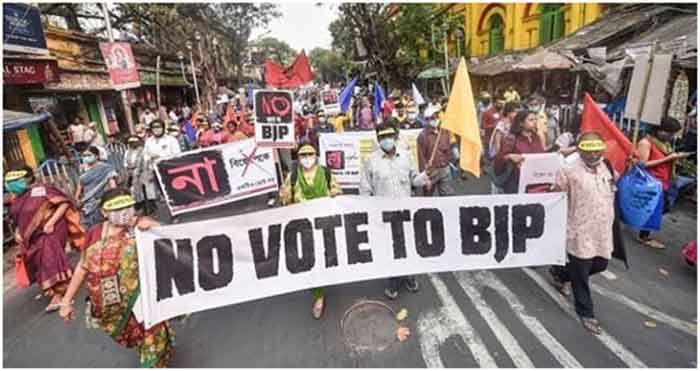
UGC led by Chairman Jagdeesh Kumar refuses to remain beyond controversy for long time.
The latest being its draft proposal of ‘dereservation’ of seats if not a suitable candidate from reserved category is found wherein it asked people’s views till 28 th January.
As expected this proposal which smacked of the ruling dispensation’s surreptitious and even direct attempts at attacking or biting away at the affirmative action policies emanating from the Constitution rightly led to protests in various quarters, There were protests opposing this proposal on JNU and other campuses and even opposition parties attacked the ruling party for its compromising attitude towards reservation rights and its desire and moves to either dilute or hollow out the provisions of these socially progressive policies and this led to an intervention from the Human Resources Ministry underlining that there is no such proposal.
This backlash to this move (https://economictimes.indiatimes.com/news/india/ugc-removes-de-reservation-draft-guidelines-from-website-amid-backlash/articleshow/107269051.cms?from=mdr) might have prompted this intervention but doubts remain. As per reports while the ‘draft outlines’ might have been removed but what Jagdeesh Kumar said sounded rather ambiguous. He said that they have been removed but because the time limit mentioned in the draft is over. (https://economictimes.indiatimes.com/news/india/ugc-removes-de-reservation-draft-guidelines-from-website-amid-backlash/articleshow/107269051.cms?from=mdr)
Remember it was only last year that University Grants Commission (UGC) had reached headlines for showing its caste blindness’ The new rules notified by it then to address grievances of students, had clubbed issues of caste discrimination with general complaints.
These rules seemed to convey an impression that UGC, the statutory body established to fund as well as maintain quality of higher education institutions wherein it is incumbent that it enables / facilitates non-discriminatory atmosphere in all such campuses of learning, seems either cavalier or oblivious of the fact that of late, higher educational institutions in India have emerged as new sites where cases of discrimination because of caste and other social origins are coming to the fore, which have even led in extreme cases to suicides by students or young scholars. Not some time ago IIT Mumbai and IIT Madras both witnessed similar tragic incidents
What looks jarring is that when proper frameworks have already been put in place, with inputs from experts and academics earlier, with even EOC ( Equal Opportunities Cell) already being functioning under it- thanks to the report of the enquiry committee formed to look into issues of caste discrimination in AIIMS led by Prof Sukhdeo Thorat, (https://www.epw.in/journal/2007/22/editorials/thorat-committee-report-caste-discrimination-aiims.html ; https://www.nlhmb.in/Reports%20AIIMS.pdf) and action taken thereafter, there was no urgent need to draft fresh rules.
This notification also appeared incongruent in an ambience where there are still increasing demands to enact Rohith Act (https://www.india.com/news/india/iit-suicides-mgahv-students-plea-to-president-for-rohith-vemula-act-5898865/ ; https://www.business-standard.com/article/current-affairs/committed-to-secularism-will-enact-rohith-vemula-act-if-voted-congress-123022600892_1.html) on the lines of the Nirbhaya Act, that can secure students from deprived communities living and studying on campuses in the country, first raised in the aftermath of tragic suicide of Rohith Vemula in Hyderabad Central University (2016) and the nationwide movement that followed it, and also there being no let up in extreme cases of suicides in higher educational institutions ( https://thewire.in/caste/darshan-solanki-suicide-iit-b-ignore-evidence-caste-discrimination). These the new rules issued by UGC clubbing caste discrimination with general complaints, rather displays the statutory body’s utmost insensitivity to such issues which effectively denies that any such discrimination exists on the campuses.
Anyone who has closely followed UGC’s trajectory in recent years and watched its approach could vouch that there was nothing surprising in these latest rules which tend to clearly invisibilise or dilute caste discrimination.
It is now history how UGC helped nearly dismantle the unique admission process developed by leading university like JNU based on ‘deprivation points’ (https://www.thehindu.com/news/cities/Delhi/the-deprived-have-greater-chance-of-seat-in-jnu/article4995136.ece) and how it ‘made education inaccessible to the marginalised’ (https://www.newslaundry.com/2017/02/05/jnu-how-the-ugc-notification-would-destroy-the-character-of-the-institute) by its ham handed approach. The scheme which received praise across country and outside for its being able to admit not only women but also students from other socially and religiously marginalised sections and the make the university a really diverse place. Thanks to the persistent resistance put up by the students and teachers, it was reported that the JNU is keen to restore the same system (https://www.thequint.com/news/education/jnu-deprivation-points-model-why-it-is-important) Of course, it remains to be seen how far it will be restored.
These rules notified by the UGC could not be seen merely as an outcome of the whim of some bureaucrat sitting in the statutory body but they resonate with the way the ruling dispensation led by the RSS -BJP has viewed the issue of caste and its attendant discriminations.
Remember the project of Hindu Unity which they envisage as a basis for their future Hindu Rashtra, starts floundering once it is acknowledged that there are internal asymmetries and exclusions in the Hindu religion / society – which have historical origins and how so called upper castes have continuously heaped untold miseries on the ‘lower caste’ and have even denied them basis humanity and continue to do so today as well. The clubbing of caste discrimination with general complaints, helps cover up all such internal asymmetries.
The draft guidelines around ‘dereservation’ might have been removed but the move does not inspire confidence. Perhaps their purpose stands served. It has gathered ”opinion’ of various stakeholders and whenever a favourable situation arise, it can be easily brought back and implemented.
May be it is an indication that if 2024 elections go in favour of the present ruling dispensation, then they will implement it.
Subhash Gatade is a left activist associated with New Socialist Initiative
















































